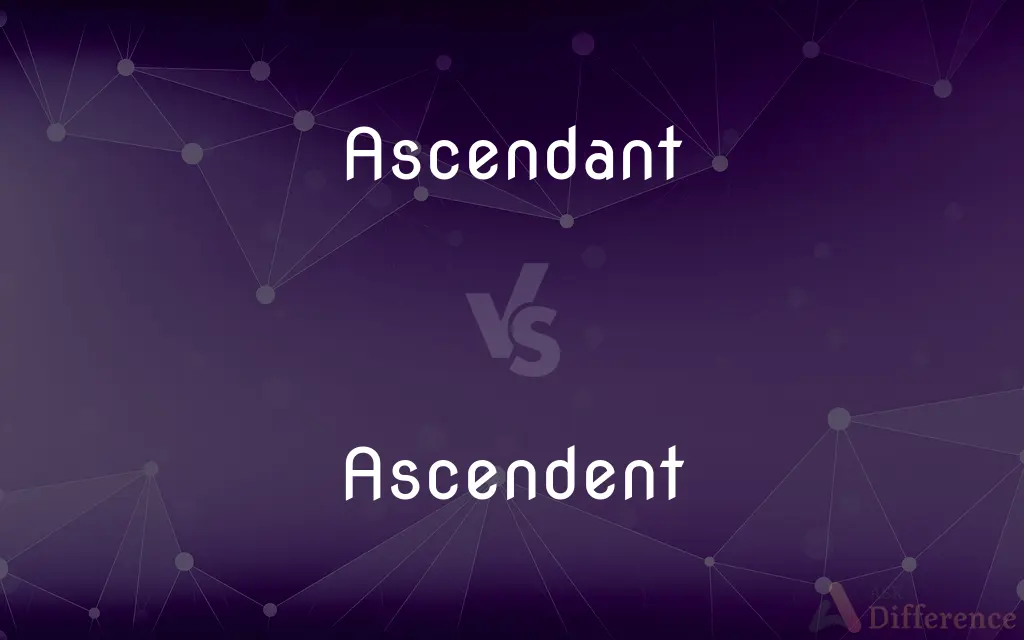Ascendant vs. Ascendent — What's the Difference?
Edited by Tayyaba Rehman — By Fiza Rafique — Updated on April 23, 2024
Ascendant refers to rising or gaining influence; ascendent, less commonly used, often denotes the same but can vary by context.

Difference Between Ascendant and Ascendent
Table of Contents
ADVERTISEMENT
Key Differences
Ascendant is typically used to describe something that is on the rise, gaining power, or becoming more influential. Ascendent, while sometimes used interchangeably, appears less frequently and can carry a slightly different connotation depending on the context, often used more in astrological or metaphorical senses.
Ascendant often appears in discussions about social or political entities gaining strength or visibility. Ascendent, on the other hand, might be preferred in more specialized or formal texts, highlighting a philosophical or metaphorical rise.
In astrology, ascendant refers to the zodiac sign that is rising on the eastern horizon at the time of one's birth, which significantly influences personality traits. Ascendent is an alternative spelling in this context but is less common in contemporary use.
The term ascendant can be found across various types of discourse, indicating its versatility and broad acceptance. Ascendent, while still valid, is more likely to appear in older texts or more specific discourse contexts, reflecting a narrower usage.
In terms of modern usage and preference, ascendant is more frequently adopted in both spoken and written English, which could suggest a trend towards standardizing this spelling. Ascendent, while understood, might be seen as a more archaic or less preferred variant.
ADVERTISEMENT
Ascendant clearly holds a more dominant position in contemporary English, suggesting its usage over ascendent might be more advisable for clarity and recognition in communication. Both terms, however, remain correct and may be used based on personal or contextual preference.
Comparison Chart
Common Usage
Commonly used in general contexts
Less commonly used
Contextual Application
Broad, including social, political, and astrological
Often limited to formal or specialized contexts
Spelling Preference
More commonly spelled as "ascendant"
Alternate spelling, less preferred
Modern Relevance
Widely recognized and preferred in modern texts
Appears mostly in older or specific texts
Example of Use in a Sentence
"He is clearly on the ascendant in his company."
"The old notion of ascendent virtues remains in some philosophical texts."
Compare with Definitions
Ascendant
The rising sign at birth time;
Her ascendant is Gemini, which explains her communicative nature.
Ascendent
Rising in power or influence (less common usage);
His ascendent trajectory in the firm was notable.
Ascendant
Gaining control or superiority;
The ascendant political party took the majority seats.
Ascendent
Astrological alternative spelling of ascendant;
His ascendent sign is Leo.
Ascendant
Superior, dominant in position;
In the debate, her points were clearly ascendant.
Ascendent
Superior, dominant in position (rare);
In the artistic community, her reputation is ascendent.
Ascendant
Rising in power or influence;
The ascendant tech company overshadowed its competitors.
Ascendent
Ascending, moving upward (rare);
The balloon was ascendent against the clear blue sky.
Ascendant
Ascending, moving upward;
The ascendant smoke signaled the fire below.
Ascendent
Gaining control or superiority (rare);
The ascendent ideology began to spread across the regions.
Ascendant
The ascendant (, Asc or As) is the astrological sign (and degree of that sign) that is ascending on the eastern horizon at the specific time and location of an event. According to certain astrological theories, celestial phenomena reflect or influence human activity on the principle of 'as above, so below'.
Ascendent
Inclining or moving upward; ascending or rising.
Ascendant
Inclining or moving upward; ascending or rising.
Ascendent
Dominant in position or influence; superior.
Ascendant
Dominant in position or influence; superior.
Ascendent
The position or state of being dominant or in control
A conservative policy currently in the ascendant.
Ascendant
The position or state of being dominant or in control
A conservative policy currently in the ascendant.
Ascendent
In astrology, the point of the ecliptic or the sign of the zodiac that rises in the east at the time of a person's birth or other event.
Ascendant
In astrology, the point of the ecliptic or the sign of the zodiac that rises in the east at the time of a person's birth or other event.
Ascendent
An ancestor.
Ascendant
An ancestor.
Ascendent
Upward in direction or proclivity.
Ascendant
Rising, moving upward.
Ascendent
In power; controlling.
Ascendant
Surpassing or controlling.
Ascendent
A person from whom one is descended.
Ascendant
Being in control; superiority, or commanding influence; ascendancy.
One man has the ascendant over another.
Ascendent
A position of power or control.
Ascendant
An ancestor.
Ascendent
Tending or directed upward.
Rooted and ascendant strength like that of foliage.
Ascendant
(usually followed by to) A royal heir assuming (a place of power).
Given his father’s ghastly demise, one would not expect such glee from the ascendant to his throne.
Ascendent
Having the most important influence.
Ascendant
Ascent; height; elevation.
Ascendent
Position or state of being dominant or in control.
Ascendant
(astrology) The horoscope, or that degree of the ecliptic which rises above the horizon at the moment of one's birth; supposed to have a commanding influence on a person's life and fortune.
Ascendent
Someone from whom you are descended (but usually more remote that a grandparent).
Ascendant
Ascent; height; elevation.
Sciences that were then in their highest ascendant.
Ascendent
Position or state of being dominant or in control;
That idea was in the ascendant
Ascendant
The horoscope, or that degree of the ecliptic which rises above the horizon at the moment of one's birth; supposed to have a commanding influence on a person's life and fortune.
Ascendent
Someone from whom you are descended (but usually more remote than a grandparent)
Ascendant
Superiority, or commanding influence; ascendency; as, one man has the ascendant over another.
Chievres had acquired over the mind of the young monarch the ascendant not only of a tutor, but of a parent.
Ascendent
Tending or directed upward;
Rooted and ascendant strength like that of foliage
Ascendant
An ancestor, or one who precedes in genealogy or degrees of kindred; a relative in the ascending line; a progenitor; - opposed to descendant.
Ascendent
Most powerful or important or influential;
The economically ascendant class
D-day is considered the dominating event of the war in Europe
Ascendant
Rising toward the zenith; above the horizon.
The constellation . . . about that time ascendant.
Ascendant
Rising; ascending.
Ascendant
Superior; surpassing; ruling.
An ascendant spirit over him.
The ascendant community obtained a surplus of wealth.
Without some power of persuading or confuting, of defending himself against accusations, . . . no man could possibly hold an ascendent position.
Ascendant
Position or state of being dominant or in control;
That idea was in the ascendant
Ascendant
Someone from whom you are descended (but usually more remote than a grandparent)
Ascendant
Tending or directed upward;
Rooted and ascendant strength like that of foliage
Ascendant
Most powerful or important or influential;
The economically ascendant class
D-day is considered the dominating event of the war in Europe
Common Curiosities
Is there a difference in meaning between "ascendant" and "ascendent"?
Generally, no, both terms can be used to describe something rising or becoming more influential, though "ascendant" is more common.
Can "ascendent" and "ascendant" be used interchangeably?
Yes, they can be, but "ascendant" is preferred for clarity and modern usage.
What are synonyms for "ascendant"?
Synonyms include rising, ascending, and dominant.
What is the most common context for using "ascendant"?
"Ascendant" is commonly used in contexts discussing rising influence or power, such as in politics or business.
Can "ascendent" be used in legal or technical documents?
Yes, though "ascendant" might be preferred for clarity.
Is "ascendent" considered outdated?
It is not necessarily outdated, but it is less common than "ascendant."
Why might one choose to use "ascendent" over "ascendant"?
"Ascendent" might be chosen in more formal or specialized contexts, or to adhere to the style of older texts.
How does the astrological meaning of "ascendant" influence its general use?
The astrological meaning of "ascendant" as a significant factor in personality can metaphorically extend to non-astrological contexts, emphasizing the rise or emergence of traits or entities.
What impact does one's ascendant sign have in astrology?
The ascendant sign in astrology is believed to affect one’s approach to life, appearance, and first impressions.
How does one determine their astrological ascendant?
It is determined by the zodiac sign rising on the eastern horizon at the exact moment of one’s birth.
Are there contexts where "ascendent" is clearly wrong to use?
No, but it's less preferred, and its use may confuse readers unfamiliar with the variant.
Which term is more likely to appear in academic writing?
"Ascendant" is more likely due to its broader acceptance and commonality.
What role does the ascendant play in shaping personality in astrology?
The ascendant is considered crucial in shaping the outer personality and physical appearance, acting as a mask one wears for the world.
How do trends in language usage affect the choice between "ascendant" and "ascendent"?
Trends favor "ascendant" as the more modern and widely recognized form, influencing its more frequent adoption.
Which spelling is preferred in British English?
"Ascendant" is generally preferred in both British and American English.
Share Your Discovery

Previous Comparison
Affirmed vs. Confirmed
Next Comparison
Unicorn vs. PonyAuthor Spotlight
Written by
Fiza RafiqueFiza Rafique is a skilled content writer at AskDifference.com, where she meticulously refines and enhances written pieces. Drawing from her vast editorial expertise, Fiza ensures clarity, accuracy, and precision in every article. Passionate about language, she continually seeks to elevate the quality of content for readers worldwide.
Edited by
Tayyaba RehmanTayyaba Rehman is a distinguished writer, currently serving as a primary contributor to askdifference.com. As a researcher in semantics and etymology, Tayyaba's passion for the complexity of languages and their distinctions has found a perfect home on the platform. Tayyaba delves into the intricacies of language, distinguishing between commonly confused words and phrases, thereby providing clarity for readers worldwide.














































